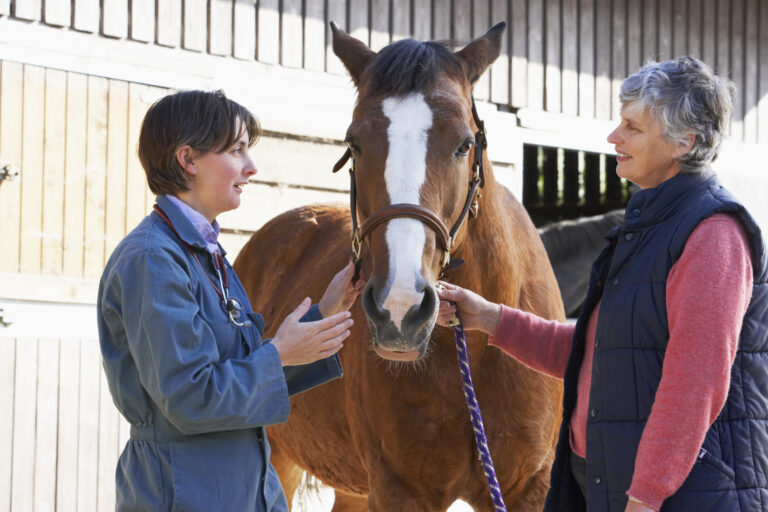
It is common in veterinary medicine for a well-crafted daily appointment schedule to be torpedoed by emergencies or a surge of animals that require urgent same-day care. In an ambulatory equine practice, even a few unexpected calls can create havoc and lead to an excessively long workday. However, practices can develop strategies to help manage this chaos.
Daytime Emergency Policies for Solo Equine Practitioners
Solo practitioners are particularly challenged by add-ons, prompting many to adopt strict policies. “I am solo, and if it’s urgent but not emergent, it gets tacked on to the end of the day,” said one practitioner in response to a query on the Facebook page Equine Vet2Vet. “Sometimes this means I drop my tech off at the office first. My clients know that sometimes emergencies arise during the day, and they are always really understanding. About twice a year we get hammered bad enough that I reschedule an appointment or two. I have one paperwork day a week that I will use to catch up.”
The majority of solo practitioners who responded to that Facebook query said clients are very understanding when they need to reschedule appointments due to emergencies. “Most clients we have to move are very understanding as they would want to have the same done for them,” one doctor responded.
Another said, “If [emergencies] impact my schedule enough where I need to move people around, I just let those clients know their appointment is being rescheduled due to an emergency and thank them for their understanding and patience. Everyone is fine with it because they want that level of service should their horse have an emergency one day. If someone is not fine with it, that tells me all I need to know about that owner, and it’s doubtful they’ll be hanging around my practice for very long.” Communicating openly with clients and thanking them for their understanding is important when navigating these moments.
Efficiency can be challenging when incorporating unexpected emergencies into your schedule. “If they can come to me, or if they’re close to where I am/will be that day, I will figure out how to see them,” said another solo doctor. “If they’re far away (45+ min), I refer to another practice.” Creating options for clients that minimize schedule disruptions can be an effective strategy.
Daytime Emergency Policies for Multi-Doctor Practices
Larger practices sometimes appoint one veterinarian to be on call during the day. Other practices send the veterinarian who volunteers, is closest, finishes their day first, or is on call that night. “We are on call one day a week (7 a.m.-7 a.m.), so we tend to schedule the on-call doctor with no more than three appointments for an on-call day and try to keep the doctor within a reasonable distance,” said one veterinarian at a seven-doctor practice. “Clients are told the doctor is on call and arrival time may change when they schedule the appointment, and some clients will choose to be scheduled with a doctor not on call. We have a daytime ER fee. If it’s truly emergent we go right away and move appointments around. If more urgent but stable, it gets added on to the end of the day.” Having the doctor who is on call that night take daytime emergencies can work well if they are scheduled lightly and locally that day.
Sending the veterinarian who finishes their day first can cause resentment. That doctor might feel like their efficiency is being punished. Sending the closest veterinarian might make sense in some situations, but it can also create resentment if other doctors have lighter schedules. Asking for volunteers works well until no one volunteers. Appointing one doctor to be on call during the day works well if there are generally enough emergencies to support revenue production.
One practitioner replied, “We have an owner and four associates. We each have a dedicated emergency day that goes 24 hours during the week. We originally sent whoever was the closest, but we started getting busy with so many emergencies (and having to reschedule regular appointments) that we switched it to this way and I prefer it.”
Another commented, “We are a five-doctor practice with about 1- to 1.5-hour radius from the clinic. Typically, whoever is closest goes unless it’s getting close to on-call time. Then the on-call person takes it. It’s rare one of us has extra space in our schedule but if we do, that person tends to take it. We charge a full ER fee during daytime if it causes the vet to have > 10-hour workday. This is paid to the vet.”
Final Thoughts
Whatever strategy your practice adopts for daytime emergencies, it is important that it is planned and equitable. If possible, designating one doctor for emergent and urgent calls each weekday during regular hours can minimize disruptions and client dissatisfaction.
Related Reading
- Starting Your Own Equine Practice
- Business Briefs: What to Expect as a Relief Veterinarian
- Business Briefs: Managing Practice PTO and Emergency Coverage During Holidays
Stay in the know! Sign up for EquiManagement’s FREE weekly newsletters to get the latest equine research, disease alerts, and vet practice updates delivered straight to your inbox.



![[Aggregator] Downloaded image for imported item #18391](https://s3.amazonaws.com/wp-s3-equimanagement.com/wp-content/uploads/2025/09/30141438/EDCC-Unbranded-5-scaled-1-768x512.jpeg)
